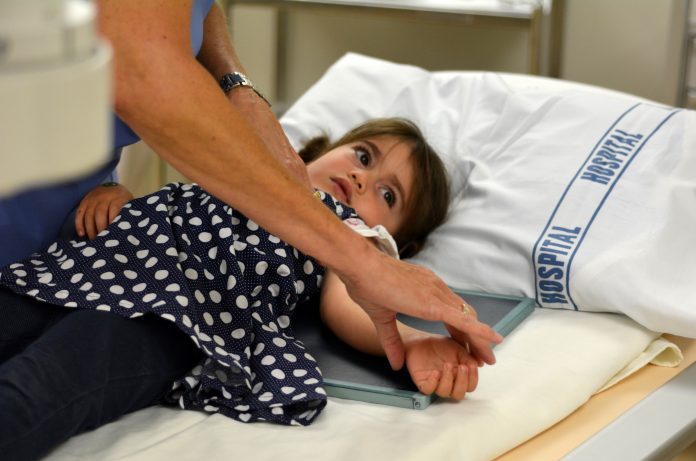Versus Arthritis speaks to award-winning rheumatologist Dr Fiona Watt about clinical research into osteoarthritis
Dr Fiona Watt, based at Oxford’s Kennedy Institute of Rheumatology, was recently awarded a prestigious UK Research and Innovation Future Leaders Fellowship. The fellowship will also allow Dr Watt and her team to explore the development of new treatments to manage the pain caused by osteoarthritis.
The condition, once thought to be limited to the elderly, affects 9 million people of all ages in the UK. The focus of this research (which is about early intervention) could be life changing for people living with chronic pain.
Osteoarthritis can affect any joint in the body. Discomfort can be experienced in the hips, hands and knees and can impact mobility. Osteoarthritis is associated with roughening of cartilage and damage to the joint which can lead to significant pain and stiffness. Depending on individual circumstances, there may be limited options for treatment.
Dr Watt explains:
“We know current perceptions and misconceptions about arthritis are causing two in five people to feel isolated on a regular basis. This can mean people don’t seek the treatment or support they need to live well or identify positive preventative strategies early on in the condition.”
Recommended treatments for osteoarthritis begin with steps that people can take without being reliant on medication, such as regular physical activity, especially in the form of walking, strengthening exercises for particular joints and maintaining a healthy weight. Everyone’s experience of arthritis is different, so we recommend people to discuss their self-management options with a healthcare professional.
For some, medications such as common topical treatments to manage pain such as over the counter Non-steroidal anti-inflammatory drug (NSAID) gels or creams can be useful in pain relief. Topical treatments may be effective for managing pain in the knees and hands but maybe less so in alleviating discomfort in the hips. For those needing stronger pain relief, they may be prescribed other tablet medication following a consultation with their GP.
Acute joint injury clinical studies
To try to improve understanding of osteoarthritis, Dr Watt has conducted studies with a focus on a subgroup of people who have experienced an acute joint injury, which is a major risk factor for future osteoarthritis.
She shares her findings:
“In these studies, we see around 50% of individuals develop so-called ‘post-traumatic osteoarthritis’. Using a combination of imaging to detect changes in the joint and patient-reported outcome measures, we have shown that joint injury triggers an immediate, inflammatory, mechanically driven response, some of which appears necessary for later osteoarthritis.”
Dr Watt continues:
“Being able to predict who will develop osteoarthritis, either as a result of injury or just by getting older, is something that we believe is essential for us to make progress in preventing and treating this disease.”
Healthcare practitioners are addressing the knowledge gap
More healthcare practitioners are increasing their knowledge about how arthritis can impact their patients’ lives. More people from a range of ages are visiting their local healthcare providers with questions about symptoms. Arthritis can be diagnosed as the root cause of pain, rather than being mistaken for common aches and pains. This is important to ensure individuals can receive the appropriate treatment at the right time.
“If both clinicians and people who may have arthritis remain stuck in the misperception that arthritis is an inevitable part of ageing and that there is nothing to be done to help manage the condition,” Dr Watt continues, “time may be lost in patients accessing essential treatment.”
Engaging with patients who have also visited their GP for advice, offers Dr Watt continual insight into where there are gaps in recognising symptoms of arthritis. She says: “Patients we’ve talked to do have an awareness that osteoarthritis is a disease that isn’t generally well-understood by both patients and some healthcare providers.”
She continues:
“Healthcare providers would benefit from knowing the essentials: why osteoarthritis starts, why it gets worse in some people and not in others, why a joint is painful or swells, why the pain is better on some days, but not others. Having this knowledge would give practitioners insight that ultimately better supports patients in exploring their current treatment options and us as researchers were able to develop new treatments.”
Frontline support through core skills workshops
The majority of people living with musculoskeletal conditions are managed in primary and community-based care. On average, 1 in 5 people in the UK consults their GP about a musculoskeletal condition every year. The rate of demand on the frontline has identified a training need which has been addressed by Versus Arthritis’ development of a Core Skills programme which aims to drive improvement in healthcare delivery.
Core Skill programme workshops are designed specifically for healthcare professionals and run throughout the year across the UK. They deliver improved skills in treating patients with musculoskeletal conditions including osteoarthritis.
Investing in the development and dissemination of new training and education resources for professionals will have a direct impact on improved patient care. These core skills support identifying appropriate treatments at the right time to make a positive impact in the lives of people with arthritis.
Dr Fiona Watt leads the Versus Arthritis Musculoskeletal Disorders Research Advisory Group and divides her time between two centres of excellence supported by the charity: the Centre for Osteoarthritis Pathogenesis and the Centre for Sport, Exercise and Osteoarthritis.
The Core Skills programme has been developed in collaboration with the Royal College of General Practitioners (RCGP).
For more information about e-learning and workshops for professionals, visit https://www.versusarthritis.org/about-arthritis/healthcare-professionals/core-skills-in-musculoskeletal-care/
Dr Fiona Watt
University Research Lecturer
Oxford’s Kennedy Institute of Rheumatology on behalf of Versus Arthritis
Tel: +44 (0)1865 612 642
fiona.watt@kennedy.ox.ac.uk
www.kennedy.ox.ac.uk
www.versusarthritis.org
www.twitter.com/versusarthritis











